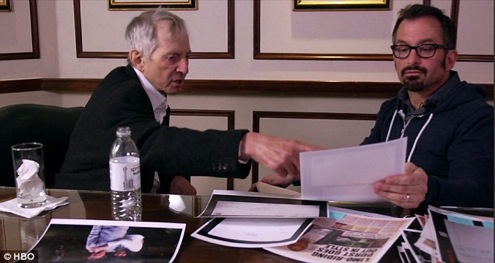Let's get real. The makers of The Jinx are not the bad guys
03/18/15 01:03 PM

By ED BARK
@unclebarkycom on Twitter
What did he do and when did he do it?
Those are the true paramount questions regarding long-suspected serial killer Robert Durst.
But in recent days, it’s been more a case of “What did they know and when did they know it?” Those questions are being pointedly aimed -- by numerous critics -- at filmmakers Andrew Jarecki and Marc Smerling, whose finale of The Jinx: The Life and Deaths of Robert Durst made quite an impression on HBO Sunday night. Its last words -- “Killed them all, of course” -- came from Durst via a “hot” mike in a restroom. The End. Which, of course, is only the beginning.
Durst, who was arrested in New Orleans on the night before HBO aired the last chapter of The Jinx, is currently back where he almost assuredly belongs. Which is behind bars.
But the overall end result of The Jinx, which aired for six consecutive Sundays, seems to be getting more than a bit lost amid a swirl of post mortems on “timelines,” the filmmakers’ responsibilities to law enforcement officials and whether they “manipulated” some events for maximum dramatic impact.
Principally at issue is whether Durst’s audio “confession” (or whatever it was) actually went undiscovered for two years or “many months” following the final on-camera interview with him. That’s the one in which Jarecki confronted Durst with copies of those two now infamous “BEVERLEY HILLS” letters, one in which the writer alerted police to a “cadaver” and the other of which was written earlier to the eventual murder victim, Susan Berman. A belching Durst at last looked flummoxed, even though still denying that the block lettered “CADAVER” note had also come from him.
Let’s get to the all-important bottom line. The filmmakers, not any branch of law enforcement, uncovered the second “BEVERLEY HILLS” letter during the course of their own exhaustive detective work. Durst otherwise would still be walking free. Whatever his cravings for publicity -- he was the one who contacted Jarecki and then agreed to be interviewed -- Durst remained a rich man whose first wife’s 1982 disappearance has never been solved. Nor has Berman’s murder. And when Durst admitted to dismembering and garbage-bagging a 71-year-old man in Galveston, his high-powered Texas defense team, led by headline-basking Dick DeGuerin, got him off on a self-defense plea. More and more, truth is stranger than fiction.
Those who doubt the filmmakers’ motives or timeline might also try swallowing this whopper from LAPD Deputy Chief Kirk Albanese, who told reporters that Durst’s arrest in connection with Berman’s murder was the result of independent detective work.
“We based our actions on the investigation and the evidence,” he said on the day after The Jinx finale. “We didn’t base anything we did on the HBO series. The arrest was made as a result of the investigative efforts and at a time that we believe it was needed. We’re constantly looking at cold cases -- this being one of them.”
Whatever they were looking at apparently was with a blind eye. Until The Jinx did their work for them, there was absolutely no indication that the LAPD was on the scent of anything. Meanwhile, the filmmakers juggled their responsibilities in terms of alerting law enforcement to what THEY had uncovered. In that context, Jarecki’s explanation to George Stephanopoulos on Monday’s Good Morning America is worth re-printing in its entirety:
“We talked a lot about it with our legal advisors and we said, ‘Look, if we go to the authorities now, we’re missing the opportunity to actually get the real story from him. And it may take years for them to do that because the truth is, as filmmakers, we have the freedom to do things that maybe the law enforcement authorities wouldn’t have.’ But at the same time, we didn’t want to hold it back if it was going to take forever. So all we could do was get him into the chair again, which took a lot of work, and then, when we had his reaction, that was when we felt the time was right for us to show that to them. And that was many, many months ago.”
In investigations large and small, filmmakers or reporters don’t work hand-in-hand with police. They uncover evidence on their own and present it. Law enforcement officials then can do what they will with such information. Regarding Durst, they mostly didn’t do much of anything since he beat the Galveston murder rap back in 2003.
Attorney DeGuerin, who now is representing Durst anew, is having a good time fingering HBO and the filmmakers as the real culprits.
“It’s not based on facts,” he told reporters of The Jinx. “It’s based on ratings.”
No, it IS based on facts. Facts that the six-chapter film uncovered without any help from the LAPD. Those facts will now presumably be part of a new trial and another set of jurors.
No one should be overly confident of a Durst conviction, given the high-profile murder acquittals of O.J. Simpson, Robert Blake, Casey Anthony and George Zimmerman. But whatever the verdict, the makers of The Jinx are not the bad guys here. On the contrary, they’re instead the people who put the wheels of justice back in motion while cops and prosecutors repeatedly either failed or stopped trying altogether.
Email comments or questions to: unclebarky@verizon.net
